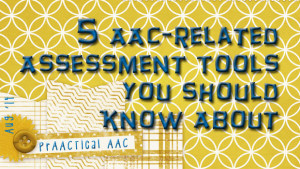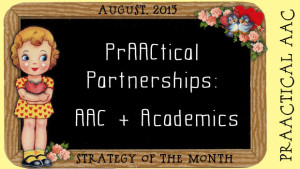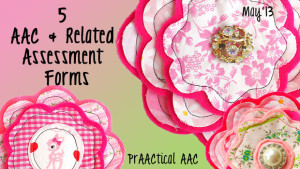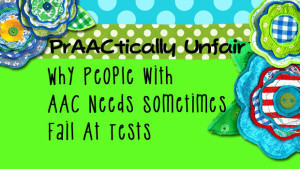August 27, 2014
by Carole Zangari -

It’s the beginning of a new semester for us, and that got us thinking about assessment for our new and returning clients with AAC needs. Here are some of the tools we’ll be thinking about over the next few weeks. AAC Profile: A Continuum of Learning (Kovach, 2009) Checklist of Communication Competencies, Revised (Bloomberg, West, Johnson, & Iacono, 2009) Functional Communication Profile, Revised (Kleiman, 2003) Social Networks: A Communication Inventory for Individuals with Complex Communication Needs and Their Partners (Blackstone & Hunt Berg, 2012) The Test of Aided-Communication Symbol Performance (TASP; Bruno, 2010) ::::::::::::::::::::::::::::::::::::::::::: Blackstone, S., & Hunt Berg, M. (2012). Social Networks: A Communication Inventory for Individuals with Complex Communication Needs and Their Communication Partners. Verona, WI: Attainment. Bloomberg, K., West, D., Johnson, H., & Iacono, T. (2009). Triple C Manual and Checklists, Revised. SCOPE: Victoria. Bruno, J. (2010). Test of Aided-Communication Symbol Performance. Pittsburgh, PA: Dynavox Mayer Johnson. Kleiman,... [Read More...]
Filed under: PrAACtical Thinking
Tagged With: assessment, testing, tests
August 17, 2013
by Carole Zangari -

Like many of you, we are always racking our brains trying to help students who use AAC be successful academically. Because we serve these students in a clinical setting, we could easily pass on the opportunity to align our AAC goals with academic standards but what would be the fun in that? Here are some things we try to think about with school-aged kids who have AAC needs. SLP to SLP If it takes a village to raise a child, how many people does it take to help a kids with AAC needs to develop communicative competence and succeed academically? It boggles the mind. As SLPs, message is this: We have to work together. Many kids who use AAC have private therapies in addition to their school services, and yet, we rarely connect. We have to find a way to do a better job at this so that kids with... [Read More...]
Filed under: Strategy of the Month
Tagged With: assessment, classroom, collaboration, education, testing
May 27, 2013
by Carole Zangari -

Ask any 10 professionals how they do AAC evaluations and you’re likely to get 10 different answers. We look for the same things (I think!) but go about it in different ways. We’re always happy to take a look at the protocols and forms that our colleagues develop and/or use. Here are some that might be of interest. 1. Bloom and Lahey Recording Sheet for staging language by Sherri Vernelso and Emily Pratt 2. Kate Ahern’s form for AAC device trials 3. SETT process assessment forms by HILIA Coordinators of Assistive Technology Services 4. The Functional Behavior Assessment Worksheet and Observation Forms by PaTTAN 5. Assessing the metaphoric use of pictures (e.g., Minspeak, Unity) protocol and forms by Gail Van Tatenhove If you have a protocol or form that you’d like to share, please get in touch. We’re always looking for new and better tools.
Filed under: PrAACtical Thinking
Tagged With: assessment, evaluation, forms, resources, testing
November 29, 2012
by Carole Zangari -

What do these situations have in common? Renting a car with a new GPS system to drive to an interview in a foreign city Hosting a dinner party and cooking a gourmet meal in someone else’s kitchen Using new software to deliver a presentation at a conference If you said they all create anxiety, you’re right. But here’s something else: They all require you to do something unfamiliar or difficult and learn a new tool at the same time and produce results under stressful conditions. We would never put our AAC learners under such stress and expect them to perform well, would we? Of course not! Except when we: Ask them to use an AAC device/app that they are still learning to answer test questions Require them to use a new or exhausting motor pattern to produce a written product for grading Expect students without sufficient test-taking skills to demonstrate... [Read More...]
Filed under: PrAACtical Thinking
Tagged With: assessment, Fair Testing Practices, FTP, testing



